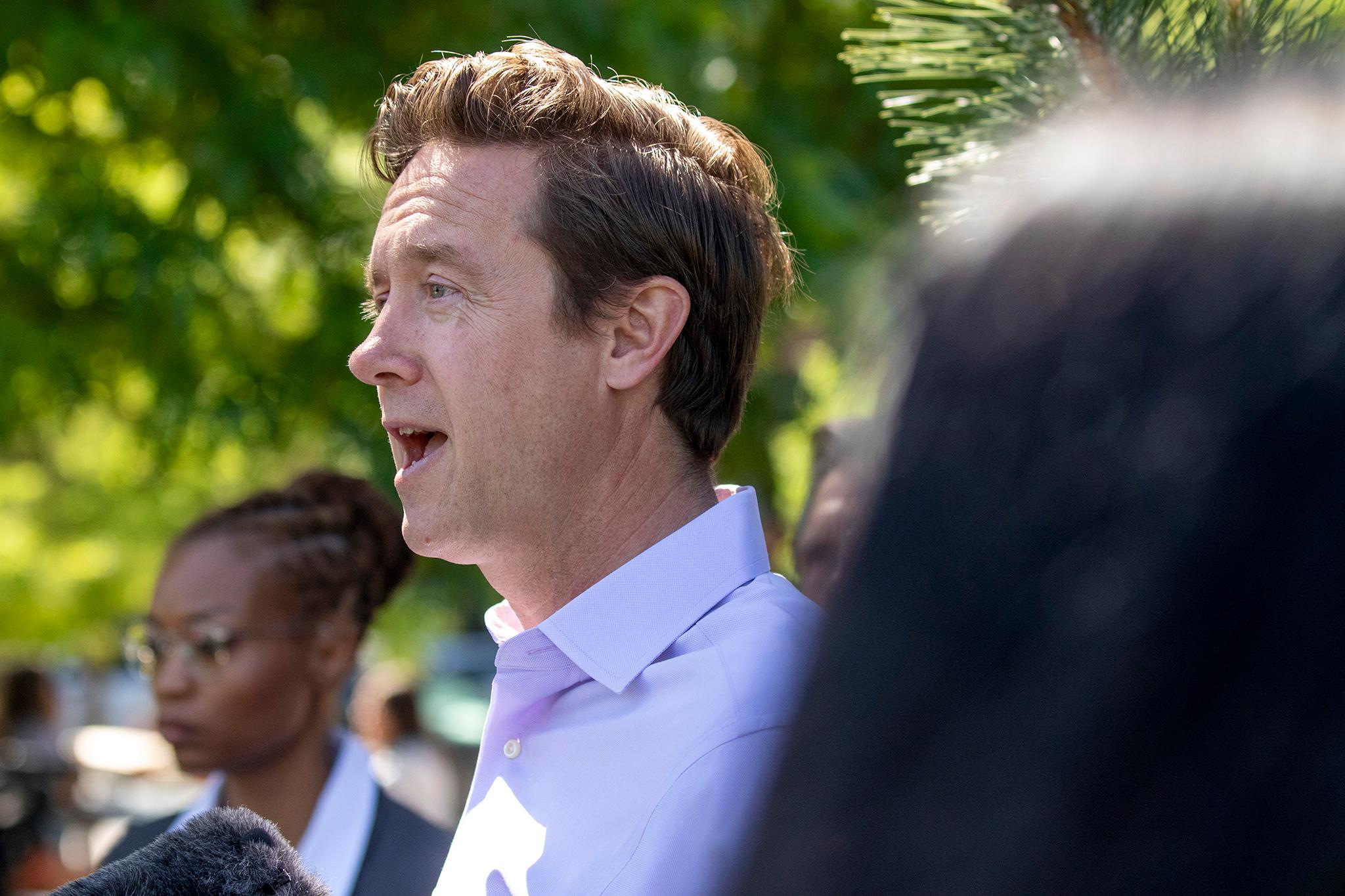In early June, Mayor Elect Mike Johnston named transparency as his first principle as he started his transition to be Denver's next mayor. But a lot of that work is taking place out of sight.
More than 500 members serving on Johnston's transition team have signed non-disclosure agreements, effectively pledging to keep the public in the dark as they help him decide how to pick the heads of multiple city departments and shape Denver.
The agreement, which the transition committee Vibrant Denver provided and Denverite has reviewed, prevents committee members from sharing confidential materials -- including materials that haven't been marked that way. Confidential materials could include documents, records, analyses and calendars that would give the public information about the city's and committee's current operations, the hiring process, strategy, the transition budget and organization, and Johnston's plans for the future.
Johnston is not alone in using non-disclosure agreements as he takes office. Outgoing Mayor Michael Hancock more quietly used non-disclosure agreements when he first came to office in 2011.
"As this is a personnel-related process and with so many people involved, to avoid individuals being talked about or potentially hurt career-wise while they're going through it, an NDA helps to protect applicants when applying through a process like this," explained Hancock's spokesperson Mike Strott.
Yet not all incoming mayors have made their teams swear secrecy. Former Mayor Wellington Webb told Denverite his transition committee members signed no such contracts.
After promising transparency, why would Johnston have people sign NDAs?
Ami Desai, the executive director of the transition committee Vibrant Denver, said that what happens in committees should be private to protect applicants hoping to work for the mayor.
Ultimately, she said, those committees, with hundreds of residents involved, have the power in the transition process.
"I think that they deserve an opportunity to be able to talk together without any of that information getting out there," said Desai. "They're testing hypotheses, and they're talking, and they haven't come to any conclusions."
The committees are doing "sensitive work," she explained. Vibrant Denver wants to protect the process so it is "safe and authentic."
The public has had a chance to share feedback with the mayor-elect through anonymous forms and in forums run by consultants, Desai said. The committees are taking ideas from everyday people through 28 separate public events.
Johnston is also holding closed-door meetings with government officials.
The next mayor has declined to allow reporters to attend meetings between himself and the heads of city agencies where he's learning about what is and isn't working in the city -- the same agencies whose work taxpayers fund.
His transition team has also not shared minutes, notes or reports about what happened in those conversations nor documents provided from Hancock's team to Johnston's.
The transition team and the Mayor's office have said access to meetings between the mayor elect and city agency heads would be unprecedented and interfere with a successful transition.
In recent years, the nature of mayoral conversations -- or even what the mayor's doing -- is less clear. The office used to publish the mayor's calendar but quit that practice citing public safety reasons.
Johnston's meeting schedule with city officials has only been provided by Hancock's office after those events have taken place when Denverite has filed open records requests.
NDAs and government secrecy have come under wider scrutiny in both Colorado governments and the private sector.
When Denverite interviewed hundreds of residents before the 2022 and 2023 elections about what they wanted to see in elected officials, they told us that transparency and trust in government were among the top 10 concerns.
Federal and state law protect the public's right to access open records and attend many meetings between officials.
A 2023 state law narrowed when governments could force employees to sign NDAs as a condition of employment, limiting the contracts to a few exceptional circumstances.
The Colorado Bill of Rights is clear about who's in charge in government: "All political power is vested in and derived from the people; all government, of right, originates from the people, is founded upon their will only, and is instituted solely for the good of the whole."
But that doesn't always translate to transparency from officials and government employees. And lately, there's even been legal tension because of it.
A recent lawsuit, alleging open-meetings violations by state House leaders of both parties, has raised questions about whether lawmakers operate in secrecy in the Capitol.
A group of media organizations has sued the Denver School Board over allegedly violating open meeting laws in the wake of the East High School shooting. A judge ordered the board to release a recording of the meeting.
Johnston's closed-door conversations and NDAs are meant to improve conversations and help him understand how government is -- and isn't -- working to help him shape how he, as mayor, will best serve Denver, according to Desai.
Said Desai: "I want the committees to be able to have an authentic conversation without feeling like they have the public watching the discourse."











